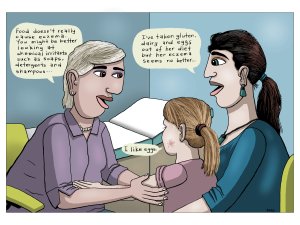Specialist GP Nikki Vadgama provides some tips to make your next paediatric eczema consult easier. She includes a review of new guidelines, resources, websites and medications for paediatric eczema management
HDC case: Care of woman in labour with abnormal CTG
HDC case: Care of woman in labour with abnormal CTG

Deputy health and disability commissioner Rose Wall today released a report finding an obstetrician and a DHB in breach of the Code of Health and Disability Services Consumers’ Rights for the care provided to a pregnant woman with abnormal fetal heart rate monitoring.
The woman, who was pregnant with her second baby, was admitted to a public hospital for a check as her due date had passed, which included cardiotocography (CTG) monitoring of the baby’s heart rate. The woman’s previous baby had been born by emergency caesarean section and she was hoping for a vaginal birth this time. The CTG showed some mild contractions with variable and late decelerations. The obstetrician offered the woman an induction of labour or a Caesarean section. While recommending a Caesarean section, the obstetrician did not advise the woman that in the circumstances of the abnormal CTG that was the only appropriate course of action.
Later that evening, the obstetrician reviewed the woman again. Although the fetal heart rate showed decelerations, the obstetrician carried out a Cook’s catheter induction. At shift handover that night, four hospital-employed midwives reviewed the CTG and decided to discontinue the monitoring despite ongoing late decelerations. The decision was made because the CTG had not deteriorated further and was no different from the earlier CTGs reviewed by the obstetrician.
In the early hours of the morning, the hospital midwife recommenced the CTG. She called the obstetrician following a prolonged period of reduced fetal heart rate variability. On rupturing the membranes there was meconium-stained liquor. The baby was delivered by Caesarean section. The baby was later diagnosed with hypoxic ischaemic encephalopathy and multiple co-morbidities.
Ms Wall found that the obstetrician failed to provide services to the woman with reasonable care and skill by not recommending a Caesarean section as the only appropriate course of action and by proceeding with the induction of labour in the presence of an abnormal antenatal CTG. Ms Wall also said that the DHB should have in place a system that ensures that staff are aware of and comply with its policies and procedures, and a culture that supports staff to voice concerns and ask questions. Ms Wall was not satisfied that was the case, as she found that midwifery staff did not follow the DHB monitoring policy or challenge the obstetrician’s management plan. Ms Wall further considered it was clear at the time of these events that the obstetrician would have benefited from greater collegial support and less onerous working hours.
Ms Wall recommended that the DHB update HDC on progress made to increase the number of employed obstetricians; consider developing local policies around intrapartum fetal surveillance; implement an updated CTG interpretation sticker and introduce mandatory fetal surveillance updating for all maternity staff. The obstetrician and DHB were required to provide a written apology to the woman.




